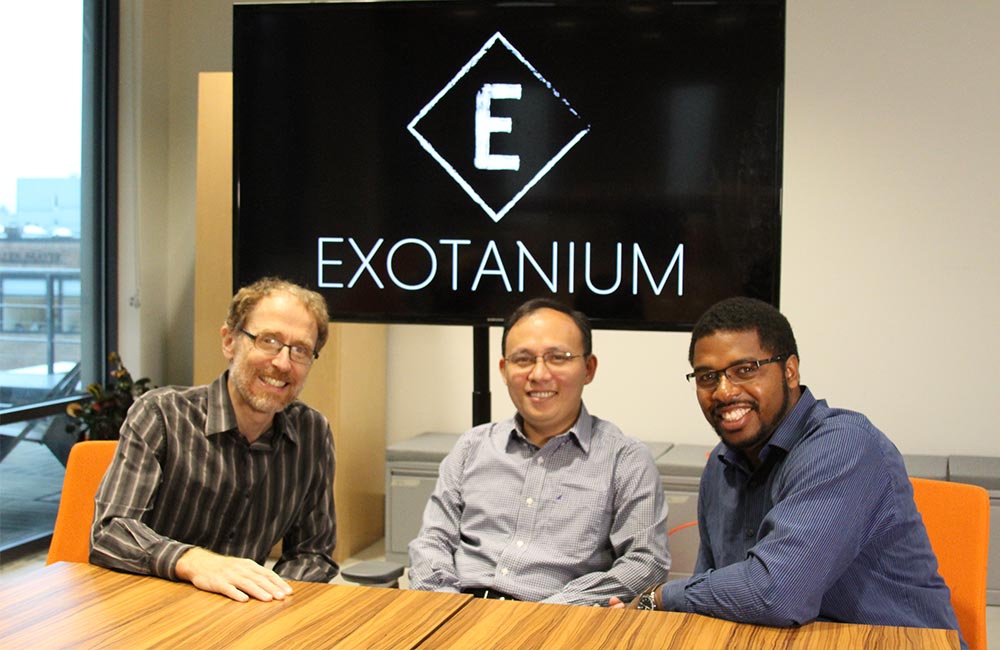
Exotanium Raises $1M Amid Increased Demand for Cloud Software Systems
The pandemic might have ended Exotanium’s ambitions before the cloud-optimization company even got off the ground.
The Rev member startup – launched in 2018 by Cornell faculty members Hakim Weatherspoon and Robbert van Renesse; and professor of computer science; and postdoctoral researcher Zhiming Shen, Ph.D. ’17 – was in the midst of fundraising when COVID-19 hit.
“We could have easily been forced to shut our doors,” said Weatherspoon, CEO of Exotanium, which has created software tools to help companies save money on running software in the cloud.
With the help of the federal government’s Paycheck Protection Plan and advice from mentors at Cornell’s Praxis Center for Venture Development, Exotanium was able to shift operations online and continue talking to investors – ultimately raising more than $1 million in pre-seed funding so far this year. In May, Exotanium began a pilot with the software company Autodesk, Inc. to test Exotanium’s concept for cloud back-end optimization.
Though the pandemic created challenges, it also led to opportunities: With most organizations operating entirely online, demand for cloud software systems is at an all-time high.
“The past few months have been a wild ride,” Weatherspoon said.
Now, the company is moving to larger offices in the Praxis Center complex in Rhodes Hall at Cornell University and hiring additional staff. The startup’s donors come from Red Bear Angels, a group of Cornell alumni; and Launch NY, an upstate New York venture development organization; as well as individual Cornell alumni.
The cloud was initially viewed as an opportunity for cost savings, since companies would no longer have to own and maintain physical servers to run their applications. But the cost of renting servers in the cloud – paid to cloud providers such as Google, Microsoft and Amazon – can consume as much as 50% of businesses’ revenue, Weatherspoon said.
Because cloud companies must have application servers available when clients need them, cloud providers often have temporarily unused servers, known as spot server instances, which they make available for a fraction of the cost of their regular service. Although, significantly less expensive, these spot server instances can be terminated at any time, making the cloud spot market unusable for most kinds of application servers.
Exotanium’s technology – called “X-spot” and based on Shen’s doctoral thesis – allows businesses to effectively navigate what’s known as the spot market, so they can take advantage of the low prices when temporary spot servers are available and then move to more reliable cloud servers when it isn’t.
“The underlying technology is called a container, meaning that you have your application and its environment, everything that it needs, packaged together, which makes it easy to test and deploy in different places,” Weatherspoon said. “And then we have an artificial intelligence base scheduler to optimize where we’re actually placing your application.”
Their research shows that the method could save businesses up to 90% on cloud application server fees, giving the company a huge advantage in a market estimated to be worth $26 billion by 2024.
“This allows for a live migration, to move applications back and forth, to make a volatile environment stable, and to provide continuous availability to the end user,” he said. “That’s an absolute, fundamental advantage we have over everybody.”
Exotanium – a name that refers to an outer shell as tough as titanium – started out in 2018 as an internet security company. But as its founders talked to companies, investors and mentors, they realized how important cloud-optimization and cost-reduction tools were to their potential client base.
“We pivoted from a security focus when we found out that people were spending a lot of money in the cloud, and they didn’t know how to rein in the spending,” Weatherspoon said. “We realized we actually had a good solution for that.”
Exotanium is a graduate of the Upstate New York I-Corps and the national I-Corps team, National Science Foundation-funded programs that offer funding and mentorship.
Having access to the mentors and experts at Rev and the Praxis Center has been invaluable, Weatherspoon said.
“We’re scientists, not businesspeople,” he said. “Praxis and the Rev provide a lot of expertise to help a company like us grow. They help scientists learn invaluable business skills to bring their technology to market.”
This article was originally published in the Cornell Chronicle.
